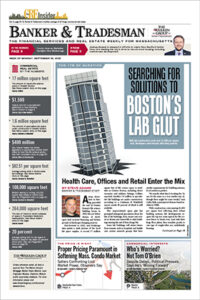
Boston Mayor Michelle Wu and Kairos Shen, newly appointed city chief of planning, answer questions from reporters after a Greater Boston Chamber of Commerce government affairs forum at the Boston Renaissance Hotel Sept. 25, 2024. Credit: Photo by Sam Drysdale | State House News Service
Did Boston Mayor Michelle Wu just blow what could be her last big chance to unstick the very stuck housing market before she heads into a reelection year?
It certainly looks that way. Wu’s pair of big announcements, aimed at ginning up confidence in her administration’s handling of crucial housing development issues, was instead greeted by the sound of crickets.
Let’s just say developers and real estate executives weren’t tapping furiously at their keyboards and burning up my phone line in praise of the mayor’s announcement of a $100 million “Housing Accelerator Fund” at last week’s Greater Boston Chamber of Commerce gathering.
Nor was anyone who did talk overjoyed that Wu would be bringing back a controversial Menino-era figure to oversee planning and development in the city.
Will Money Come with Strings?
At least at a cursory glance, Wu’s bid to provide a big financing boost to stalled plans to build new apartments, condominiums and homes across the city would seem like a welcome initiative.
But the initiative also effectively calls for the city to become an equity investor in various projects, triggering all sorts of potentially thorny questions and theoretically giving a measure of direct control over projects to City Hall, and by extension the mayor.
Given the historically rocky relationship between Wu and the city’s business and real estate industries, it’s not necessarily a prospect all would relish.
At least Wu was offering some tangible city assistance to stalled projects, which she previously shied away from despite the slump in new residential construction.
This time last year, Wu floated the idea of tax incentives to spur housing projects at the same Greater Boston Chamber event, only to pull back citing a report by Harvard economist Ed Glaeser that questioned whether the size of any subsidy that the city could afford would be enough to get projects going.
Overall, the number of new apartments and condos built in the city has sunk in the three years since she took office – something that could well send rents up faster than normal next year, when the mayor is up for reelection.
The downturn began in earnest in mid-2022, as the Federal Reserve began hiking rates in its bid to curb inflation. The move had a serious, nasty side effect for developers with plans for new housing, driving up borrowing costs.
But Wu’s progressive agenda compounded matters, from her quixotic push to bring back rent control scaring developers, investors and lenders to her insistence on barreling ahead with tough new building emissions and affordable housing mandates that raise the baseline cost of construction and shrink buildings’ operating incomes, respectively, at a time when developers’ cost of capital is still high.
A Firm ‘No’ to Affordability Pleas
Wu’s new $100 million housing initiative is no done deal, requiring City Council approval and work by her administration drafting the rules and regs for the new program.
And it comes even as the mayor, in comments after her annual speech to the Greater Boston Chamber of Commerce, dashed any hopes she might at least postpone the enactment of one her most controversial housing initiatives in response to NAIOP-MA’s entreaty the week before.
In response to a question by chamber chief Jim Rooney, Wu insisted the city will be moving ahead on Oct. 1 with a controversial requirement that 17 percent of all units in new apartment and condo buildings be money-losing, affordable set-asides – up from 13 percent in the city’s outer neighborhoods – and another 3 percent dedicated to holders of government housing vouchers, units that can require a lengthy bureaucratic back-and-forth to fill even if they come with guaranteed rental income.
The mayor’s second major announcement last week – bringing back Kairos Shen to become the city’s new planning and development czar starting Oct. 15 – is also not being viewed with unmitigated joy by developers and business community insiders.

Scott Van Voorhis
No one is going to go on the record and diss the guy who will soon hold the fate of their development project in his hands.
However, Shen was chief planner at the old Boston Redevelopment Authority for over a decade, only to get ousted in 2015 after the mayoral administration changed over. Mayor Marty Walsh commissioned a damning McKinsey report found that the agency that he played a leading role in running was a dysfunctional mess of interminable design reviews and “unwritten rules” for how projects were evaluated.
Shen went on to become an associate professor and executive director at the MIT Center for Real Estate, so there’s no question he’s extremely talented and dedicated planner with plenty of relationships across the development community.
But have Shen’s management skills improved? Wu had better hope so or her already strained relationship with the development and business community could get a lot worse.
Scott Van Voorhis is Banker & Tradesman’s columnist and publisher of the Contrarian Boston newsletter; opinions expressed are his own. He may be reached at sbvanvoorhis@hotmail.com.






